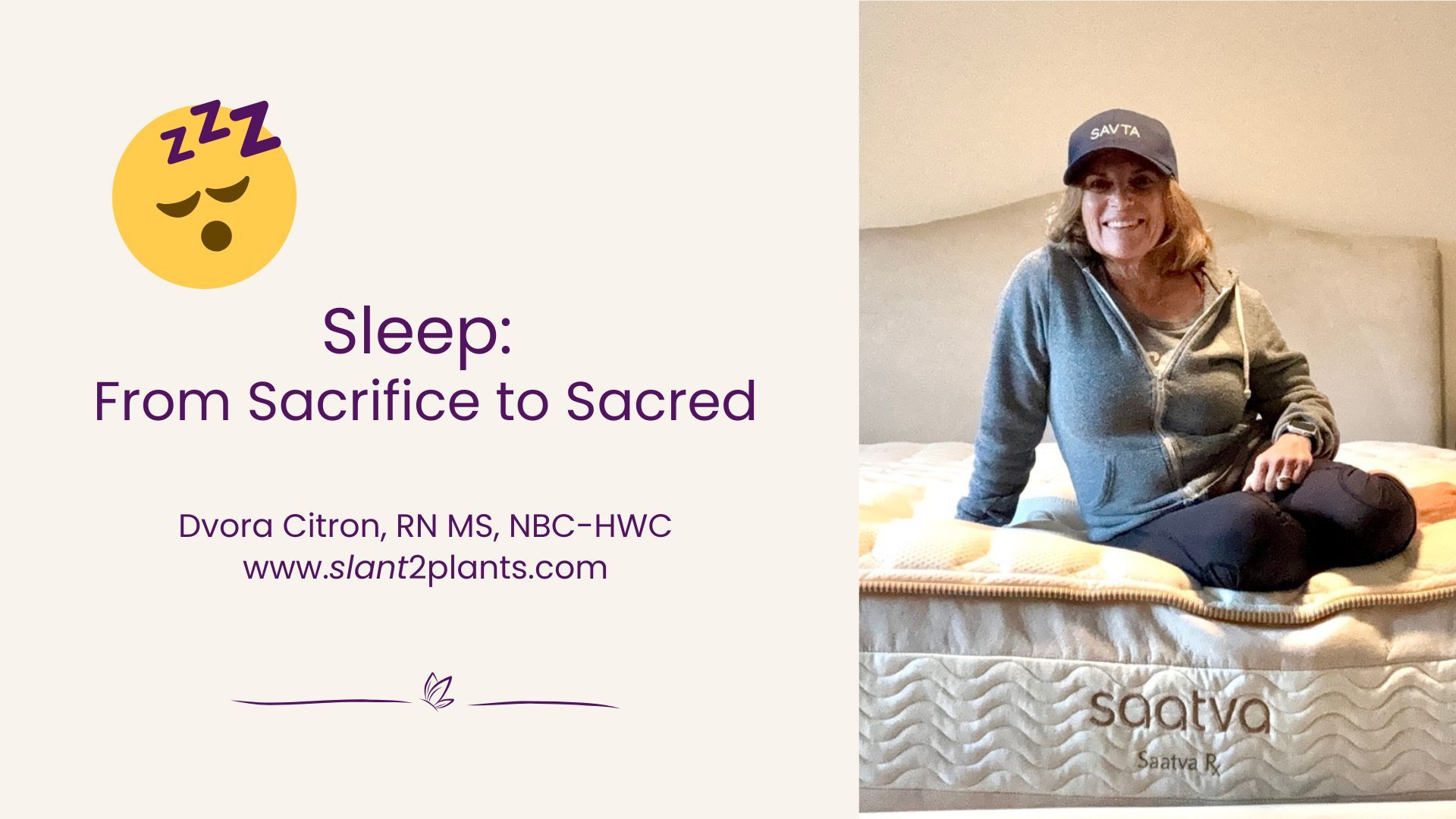Sleep: From Sacrifice to Sacred — Why Rest Is the Secret to Health, Longevity, and Feeling Sexy in Your 60s
Sep 11, 2025
Sleep is more than rest. It is one of the most powerful determinants of health, longevity, and vitality. Yet for much of my life, I resisted it, dismissed it, and even sacrificed it. I thought of sleep as wasted time — hours stolen from studying, exercise, working, or squeezing more into the day.
Now, after decades of experience as a nurse, a mother, a grandmother, and a health coach, I have come to see sleep as nothing less than sacred. Sleep is restorative medicine — the foundation of energy, mood, memory, and long-term health.
Why Sleep Matters More Than We Realize
Research confirms that quality sleep is as essential as nutrition and exercise for healthy living. It affects nearly every system in the body:
-
Brain and memory – Sleep consolidates learning and improves focus.
-
Metabolism – Poor sleep disrupts hormones, increases hunger, and raises risk of obesity and diabetes.
-
Immunity – Adequate sleep strengthens your body’s defense against infection.
-
Longevity – Adults who regularly get fewer than 6 hours of sleep per night have a higher risk of chronic disease and early death.
Lifestyle Medicine recommends 7–9 hours for most adults, 8–10 hours for teenagers, and 7–8 hours for older adults.
My Early Relationship With Sleep: Sacrifice
As a teenager, I stayed up until 1 AM studying, then woke at 6 AM to run before class. I believed that the more waking hours I had, the more I could accomplish.
Later, as a new nurse working night shifts, my sleep suffered even more. Many days I felt like a zombie. Eventually, I left nights behind, only to enter the chapter of motherhood. With three children, part-time work, and a marriage to nurture, restorative sleep remained elusive.
It wasn’t until later in life that I began to practice healthy sleep hygiene — focusing on consistency, routine, and a restful environment. Today, my sleep is generally strong. But on restless nights, I remind myself of a phrase I shared with my children: you can still have some of your best days with very little sleep.
Lessons From the School Nurse’s Office
In my 25 years as a high school nurse, I saw students living the same pattern I once had — burning the candle at both ends.
When teens came into my office with headaches, fatigue, stress, or difficulty concentrating, I often pulled out a 24-hour chart. I would block off 8–10 hours for sleep and explain that this was not wasted downtime, but rather their body’s requirement for growth, learning, and thriving.
The truth is, many modern schedules work directly against healthy sleep: late-night homework, early morning practices, and a culture that rewards busyness over rest. But here’s what concerns me most: before jumping to diagnoses, medications, or formalized educational plans such as 504s and IEPs, I believe we need to protect and prioritize the basics — sleep, nutrition, and physical activity.
The epidemic of attention deficit and depressive disorders that continues to skyrocket has to be closely connected to insufficient sleep, chronic insomnia, and the prevalence of ultra-processed foods (UPFs). While medication and educational supports certainly have their place and can be life-changing, I want to see parents and pediatricians first asking the simple but profound questions:
-
Is this child getting enough sleep?
-
Are they eating a nutrient-rich, whole-food diet?
-
Are they getting appropriate physical activity every day?
These foundations should be the starting point for every child’s health and learning plan.
Generational Shifts: My Children and Their Children
Now, as a grandmother, I see another fascinating layer: the way my adult children raise their own kids. Unlike me, they prioritize strict sleep routines. Bedtime and nap schedules are non-negotiable. What surprises me most is that they will even wake a sleeping baby to protect the rhythm of the day.
To me — and to my husband — this feels counterintuitive. I can still hear my grandmother’s whisper: “Never wake a sleeping baby.”
But research supports them: consistent routines in childhood are linked to better emotional regulation, stronger cognitive performance, and healthier long-term sleep habits. Where I once resisted sleep, and my children now fiercely guard it for their little ones, I see a through-line: an evolving respect for rest as essential — though practiced in different ways.
Sleep and Aging: From Challenge to Sacred
As we age, sleep changes again. Older adults often experience lighter, more fragmented sleep and earlier wake times. Deep, restorative slow-wave sleep declines with age. Add in medical conditions, medications, or reduced outdoor activity, and restful nights can feel elusive.
Yet, sleep is no less important in older adulthood. In fact, it may be even more critical. Poor sleep is linked with memory decline, slower reaction times, increased risk of falls, mood changes, and faster progression of chronic disease.
Tips for Better Sleep in Older Adults
-
Prioritize sleep hygiene: consistent schedule, cool/dark/quiet room, avoid caffeine or alcohol late in the day.
-
Stay active: regular physical activity, especially outdoors, improves sleep quality and circadian rhythm.
-
Morning sunlight: natural light exposure helps regulate melatonin cycles.
-
Mind-body practices: mindfulness, relaxation techniques, and yoga reduce nighttime anxiety.
-
Seek medical support: issues like sleep apnea or restless legs often go undiagnosed but can dramatically affect sleep.
Studies show that older adults who maintain 7–8 hours of sleep per night experience better cognitive health, lower risk of Alzheimer’s disease, and improved longevity.
Medications and Supplements
Not being a medical doctor or pharmacist, I will not address sleep medications, other than to say that there are many things to try before and in conjunction with using medications to address sleep issues. Such medications and supplements should be used in consultation with your medical specialist, as they may have side effects and/or interactions with other medications you are currently taking.
From Resistance to Respect
Looking back, I see how my relationship with sleep has evolved across decades and generations. From sacrificing it in my youth, to teaching teenagers to respect it, to watching my children guard it fiercely for their own kids, to now cherishing it as sacred in my own aging — sleep has been a thread woven through every stage of my life.
It isn’t always perfect. We all have nights where sleep evades us. But what matters most is cultivating long-term patterns that honor the body’s need for rest. Sleep is not wasted time. It is the most natural, restorative medicine we have.
So today, when I wake after a restless night, I remind myself: I’ve had some of my best days with very little sleep. And because I’ve built healthy habits, I know my body will restore itself — carrying me forward with strength, resilience, and gratitude for the sacred gift of sleep.
Key Takeaways
-
Teens need 8–10 hours of sleep per night for growth, learning, and emotional well-being.
-
Adults need 7–9 hours, while older adults benefit most from 7–8 hours.
-
Poor sleep is linked with chronic disease, cognitive decline, and impaired immunity.
-
Good sleep hygiene, physical activity, natural light, and mindfulness can transform sleep at every stage of life.
Conclusion: Honoring Sleep as Sacred
For much of my life, I sacrificed sleep in the name of achievement, caregiving, or simply “having more time.” But now, I see sleep as sacred — a gift we give ourselves every night that carries us into stronger, healthier, more vibrant days. Whether you’re a teen pushing through homework, a parent raising young children, or an older adult adjusting to new rhythms, sleep is not wasted time — it is the foundation of vitality and longevity.
So tonight, consider how you can honor your body’s need for rest. Protect your bedtime, create an environment that invites peace, and remember that every hour of restorative sleep is an investment in your future self.
🌙 Sleep and Feeling Sexy in Our 60s
Feeling sexy, vibrant, and alive in your 60s isn’t just about how you look — it’s about how you feel. And nothing makes us feel more radiant than being well-rested. Good sleep restores not only our bodies but also our mood, resilience, and vitality.
If you’re ready to lean into this next chapter of life with energy, sparkle, and purpose, I invite you to join me inside my Sexy in Your 60s program — where we explore the pillars of vibrant living, from restorative sleep to nourishing nutrition, joyful movement, and beyond.
DON'T MISS Sexy in Your 60s and discover how honoring your sleep can help you feel confident, radiant, and fully alive — in your 60s and beyond.
How Can I Get More Sleep?
If you’re looking to improve your sleep — along with your nutrition, energy, and overall well-being — I’d love to support you.
Book a Discovery Call with me to explore how personalized health and wellness coaching can help you build habits that last.
Resources
Please note: As an Amazon Associate, I earn from qualifying purchases. I am sharing items with which I have direct experience and that I find useful in my pursuit of healthy living, self-care, and healthy travel. I hope that you find these helpful, and I would appreciate your feedback.
Don’t Miss What’s Coming Next
Feeling inspired to move forward with more purpose, energy, and joy?
You’ll want to be first to know when Sexy in Your 60s opens again in 2026 — my signature coaching program created for women 50+ who are ready to feel more vibrant, confident, and alive in every season of life.
Join the waitlist now to stay connected, receive my latest blog posts and wellness updates, and get early access — including a special opportunity to sign up early coming soon.
I’ll make sure you don’t miss a thing.


